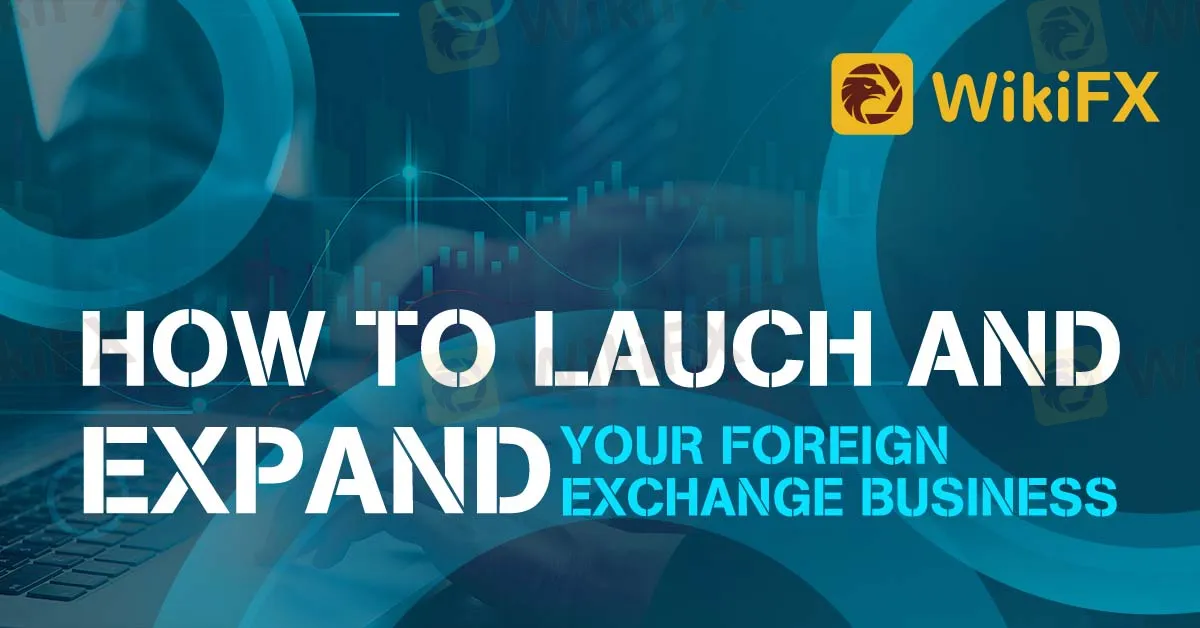简体中文
繁體中文
English
Pусский
日本語
ภาษาไทย
Tiếng Việt
Bahasa Indonesia
Español
हिन्दी
Filippiiniläinen
Français
Deutsch
Português
Türkçe
한국어
العربية
HOW TO LAUCH AND EXPAND YOUR FOREIGN EXCHANGE BUSINESS
Abstract:Just like beginning any other kind of business, starting a forex business is challenging and time-consuming. You must make decisions regarding your offerings, revenue streams, business registration, and all other related matters.

Just like beginning any other kind of business, starting a forex business is challenging and time-consuming. You must make decisions regarding your offerings, revenue streams, business registration, and all other related matters.
Even though getting started might be challenging and take anywhere from a few months to a few years, there are a few crucial things you should understand as soon as possible to guarantee a successful launch and steady growth.
Trading Alone
The first thing you must do is learn how to construct and trade strategies expertly. Start treating trading as a job, as that is the best course of action. If you want to make this a company, you need to learn everything you can about currencies, your preferred trading platform, etc.
The greatest method to identify your capabilities and determine the best product you can offer is to trade with and test tactics using your own money.
Share Online Strategies & Knowledge
The following step is to establish an internet presence. Social media, YouTube videos, and websites can all be used for this. The aim is to establish yourself as a forex industry authority.
Even if you are unlikely to be able to make money off of what you are sharing right now, the exposure you get now will be priceless in the future, especially if you are sharing something popular and distinctive.
This can also be a technique to test the viability of FX social media as a standalone business. Being an FX social media influencer may be right up your alley given how popular social media is and how much marketers would pay to be featured.
The amount of start-up capital you will require will depend on how big or small you want your business to be. You will likely need a new computer, more displays, subscriptions, etc. at the very least in the beginning.
You can start making plans to relocate into an office space or something similar once you have started your business, secured several clients, and completed some work.
What Do You Have to Offer?
Choosing what you will offer is one of the process's most important elements. Are you a programmer hoping to launch a trading platform, do you create trading bots, or are you an individual wishing to teach online courses?
This phase is crucial since it determines your target market, where you will sell your product, and how you will market to them.
How Will You Get Paid?
Once you have your product, you must choose how you will profit from it. You can choose to sell your product as a one-time purchase or as a subscription, which are both viable options.
It is significant to remember that, despite their apparent differences, two goods might be sold in the same way. For instance, it is possible to sell courses and trading bots on a monthly subscription basis.
Business Licensing
You must proceed with registering your business once you are at the point where you are prepared to move forward. Because this will vary based on where you are, you must conduct the essential research.
Even if your firm is still a one-person operation, the sooner you register it, the sooner you'll be able to apply for business loans, hire staff, and take other steps to grow.
Staff Speaking about employees, there will come a point when you won't be able to handle everything yourself once your clientele has expanded and the work is coming in. Even while hiring a whole staff is not necessary, there are ways to get the additional assistance you require.
You can get the extra hands you need when you hire freelancers, but you won't be paying them when business is slow because the money won't be coming back into the company. Even if it isn't a long-term answer, this is a fantastic tactic for new companies.

Disclaimer:
The views in this article only represent the author's personal views, and do not constitute investment advice on this platform. This platform does not guarantee the accuracy, completeness and timeliness of the information in the article, and will not be liable for any loss caused by the use of or reliance on the information in the article.
Read more

IronFX Launches $500K Grand Trading Slam with Big Prizes
Join IronFX’s $500K Grand Trading Slam for a chance to win major cash prizes. Compete in trading challenges and rank up to the grand prize! Start trading today.

What Happens if A Broker Goes Bust?
For traders, understanding what happens when a broker collapses is crucial. It serves as a reminder that choosing the right broker involves more than just attractive spreads and swift execution; it’s about safeguarding funds in case things go wrong.

Trading is Not Gambling—Unless You Make It So
In the world of online trading, a common misconception persists: trading is often seen as no different from gambling. This belief is particularly prevalent among newcomers, who may view the financial markets as a fast-paced game where winning is just a matter of luck. But trading, when done correctly, is far from mere chance!

Do You Really Know Your Trading Game?
This article challenges traders to examine whether their actions are driven by emotions or disciplined strategy, emphasizing the importance of planned risk management over impulsive, adrenaline-fueled decisions for sustainable success.
WikiFX Broker
Latest News
CWG Markets Got FSCA, South Africa Authorisation
Amazon launches Temu and Shein rival with \crazy low\ prices
CySEC Warns Against Unauthorized Investment Firms in Cyprus
Revolut X Expands Crypto Exchange Across Europe, Targeting Pro Traders
Crypto Scammer Pleads Guilty in $73 Million “Pig Butchering” Fraud
Capital.com Shifts to Regional Leadership as CEO Kypros Zoumidou Steps Down
Broker Review: Is Exnova Legit?
Why Even the Highly Educated Fall Victim to Investment Scams?
Warning Against Globalmarketsbull & Cryptclubmarket
FBI Raids Polymarket CEO’s Home Amid 2024 Election Bet Probe
Currency Calculator


